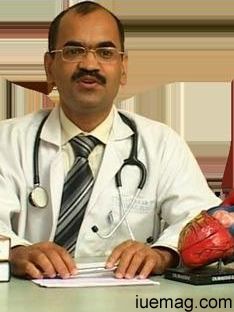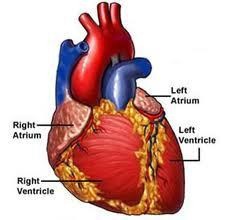

Divakar Bhat, a senior Cardiothoracic surgeon in the town believes surgery is only 1/4th th in the process of healing,
understanding the patient & listening to them are rather more important.
Am I at the risk of heart attack?
Anybody with the heart is prone for heart attack , nobody is immune to heart problems. Chest pain while working, Breathing difficulty , Unexplained Sweating are the general symptoms of heart problem.
Long life through sharp knife
Very few heart problems require surgery, but who undergoes a successful surgery will have a long life.
Beating heart surgery technique
Heart is an organ which works always. Repairing the engine while it is working is a challenge because it has multiple benefits to the patient who is undergoing heart operation.
Dr.Divakar Bhat is well known for his "Beating heart surgery" technique where in heart (engine) is repaired without stopping, thus helping the patient to recover very fast from major operation. Valve replacement, pediatric heart operations & lung surgeries are done with high success rate in his hands. By now he has performed more than 2800 operations independently, involved in more than 4300 operations as assistant surgeon, and actively involved in around 100 heart lung transplants when he was in Sydney.
Am I at the risk of heart attack?
Anybody with the heart is prone for heart attack , nobody is immune to heart problems. Chest pain while working, Breathing difficulty , Unexplained Sweating are the general symptoms of heart problem.
Long life through sharp knife
Very few heart problems require surgery, but who undergoes a successful surgery will have a long life.
Beating heart surgery technique
Heart is an organ which works always. Repairing the engine while it is working is a challenge because it has multiple benefits to the patient who is undergoing heart operation.
Dr.Divakar Bhat is well known for his "Beating heart surgery" technique where in heart (engine) is repaired without stopping, thus helping the patient to recover very fast from major operation. Valve replacement, pediatric heart operations & lung surgeries are done with high success rate in his hands. By now he has performed more than 2800 operations independently, involved in more than 4300 operations as assistant surgeon, and actively involved in around 100 heart lung transplants when he was in Sydney.

What are heart problems?
Heart Problems are mainly coronary artery diseases (CAD), which cause myocardial infarction commonly known as "Heart Attack". It is blockage developing inside the blood pipes (coronary artries) which supplies blood to heart muscles. Once the blockage is significant blood supply to the heart muscle is reduced and person will experience chest pain. If the blockage is sudden and complete, will result in Heart Attack.
How to prevent heart problems?
Heart problems can be avoided by life style modification, regular exercises, reduced fat intake, controlling blood pressure and diabetes if any, stopping smoking completely and take the life as it is One who has lived through a heart attack never forgets it - the tightness in the chest, the pain, the breathlessness, the cold sweat, and the nausea. But the good news is that survivors can still lead a healthy, productive life, provided they make a few lifestyle changes. And more importantly, stick to them.
A heart attack is not a death sentence; it can be the beginning of a new life if unhealthy lifestyle practices are weeded out. Surprisingly, that doesn't happen. While heart patients are quick to follow doc's advice initially, 30% start taking it easy after a year and 80% go back to their bad old ways within five years. The more they get better, the more they relax. The fear factor is reduced.
No wonder 80% of families complain that the patient hardly listens to them. So doctors remind them of the day before the attack when everything seemed normal. Seeming fine is not a passport to sound health. An one within a year. Indians are anyway more predisposed to it. Some 25% of them will die of heart attacks; the mean age for heart attacks here is 10 attack can happen again; around 10% of patients get another years lower than in the West. Also, 50% die before reaching hospital.
For doctors, it's almost mandatory to call up patients every three months and remind them of check-ups. An exercise test is usually done between 4-6 weeks. Medications include beta-blockers, ACE-inhibitors and nitrates. Initially, the patient is made to walk in the house. After a week, he's asked to take regular walks. In uncomplicated cases, you should be back to your normal routine within 4-6 weeks; only the intensity of the treatment increases depending on risks and gender.
Heart Problems are mainly coronary artery diseases (CAD), which cause myocardial infarction commonly known as "Heart Attack". It is blockage developing inside the blood pipes (coronary artries) which supplies blood to heart muscles. Once the blockage is significant blood supply to the heart muscle is reduced and person will experience chest pain. If the blockage is sudden and complete, will result in Heart Attack.
How to prevent heart problems?
Heart problems can be avoided by life style modification, regular exercises, reduced fat intake, controlling blood pressure and diabetes if any, stopping smoking completely and take the life as it is One who has lived through a heart attack never forgets it - the tightness in the chest, the pain, the breathlessness, the cold sweat, and the nausea. But the good news is that survivors can still lead a healthy, productive life, provided they make a few lifestyle changes. And more importantly, stick to them.
A heart attack is not a death sentence; it can be the beginning of a new life if unhealthy lifestyle practices are weeded out. Surprisingly, that doesn't happen. While heart patients are quick to follow doc's advice initially, 30% start taking it easy after a year and 80% go back to their bad old ways within five years. The more they get better, the more they relax. The fear factor is reduced.
No wonder 80% of families complain that the patient hardly listens to them. So doctors remind them of the day before the attack when everything seemed normal. Seeming fine is not a passport to sound health. An one within a year. Indians are anyway more predisposed to it. Some 25% of them will die of heart attacks; the mean age for heart attacks here is 10 attack can happen again; around 10% of patients get another years lower than in the West. Also, 50% die before reaching hospital.
For doctors, it's almost mandatory to call up patients every three months and remind them of check-ups. An exercise test is usually done between 4-6 weeks. Medications include beta-blockers, ACE-inhibitors and nitrates. Initially, the patient is made to walk in the house. After a week, he's asked to take regular walks. In uncomplicated cases, you should be back to your normal routine within 4-6 weeks; only the intensity of the treatment increases depending on risks and gender.

Heart patients should also use unsaturated fats. Mustard, groundnut, til and canola oils are good;
avoid vanaspati ghee(google it) - it increases the bad cholesterol, while lowering the good one and can cause thrombosis.
Don't fry oil too much as it changes composition. Avoid excess sugar and carbohydrates, including potatoes, white bread,
fried sweets, bakery items and junk food.
Stress management is crucial too. De-stressing, be it yoga or meditation, reduces heart attacks by almost 25% the second time, psychological counseling is also vital. According to the Harvard Heart Letter, post-traumatic stress disorder (PTSD) is often noticed. Depression affects one in four patients. Some are constantly alert for signs of an impending attack, such as a racing heart or shortness of breath. They also avoid activities that make the heart beat faster, such patients feel vulnerable. They also tend to become emotional in the initial months. It's critical to address depression with specific treatment. Fortunately in India, close-knit family ties are a comforting factor. Stress is here to stay. But the way you handle it can make all the difference. That's the heart of the matter.
What is open heart operation?
Open Heart operation is done to do repairs inside the heart like closing a hole, repair oblique replacement of the valve or reliving the stenosis.
What is CABG / bypass operation?
CABG is a major heart surgery which needs thorough check up before surgery. Blood transfusion is required most of the times and recovery lasts for 1 month. It has a Mortality of 1-3% and can lead a quality life.
What exactly is an overall healthy diet?
A well-rounded, nutrient-rich diet can help protect you from many diseases and health problems, including heart disease. But for many of us, trying to understand what constitutes good nutrition can be overwhelming. Here are the most important points to be considered.
Watch out in the next edition Our doctor will put more light on - "DIET FOR HEALTHY HEART" in the April Edition.
Stress management is crucial too. De-stressing, be it yoga or meditation, reduces heart attacks by almost 25% the second time, psychological counseling is also vital. According to the Harvard Heart Letter, post-traumatic stress disorder (PTSD) is often noticed. Depression affects one in four patients. Some are constantly alert for signs of an impending attack, such as a racing heart or shortness of breath. They also avoid activities that make the heart beat faster, such patients feel vulnerable. They also tend to become emotional in the initial months. It's critical to address depression with specific treatment. Fortunately in India, close-knit family ties are a comforting factor. Stress is here to stay. But the way you handle it can make all the difference. That's the heart of the matter.
What is open heart operation?
Open Heart operation is done to do repairs inside the heart like closing a hole, repair oblique replacement of the valve or reliving the stenosis.
What is CABG / bypass operation?
CABG is a major heart surgery which needs thorough check up before surgery. Blood transfusion is required most of the times and recovery lasts for 1 month. It has a Mortality of 1-3% and can lead a quality life.
What exactly is an overall healthy diet?
A well-rounded, nutrient-rich diet can help protect you from many diseases and health problems, including heart disease. But for many of us, trying to understand what constitutes good nutrition can be overwhelming. Here are the most important points to be considered.
- Regular physical exercises
- Balance diet, eat plenty of vegetables & fruits
- Avoid smoking, alcohol & junk foods
- Control diabetes & blood pressure if you have
- Avoid stress & strain. Learn to relax
- Regular health checkups after the age of 30
Watch out in the next edition Our doctor will put more light on - "DIET FOR HEALTHY HEART" in the April Edition.
Copyrights © 2026 Inspiration Unlimited - iU - Online Global Positivity Media
Any facts, figures or references stated here are made by the author & don't reflect the endorsement of iU at all times unless otherwise drafted by official staff at iU. A part [small/large] could be AI generated content at times and it's inevitable today. If you have a feedback particularly with regards to that, feel free to let us know. This article was first published here on March 2012.
Want to Publish About Your Business / Achievements
Let's Discuss Right Away!

All chats are end-to-end encrypted by WhatsApp and won't be shared anywhere [won't be stored either].

